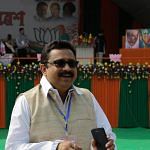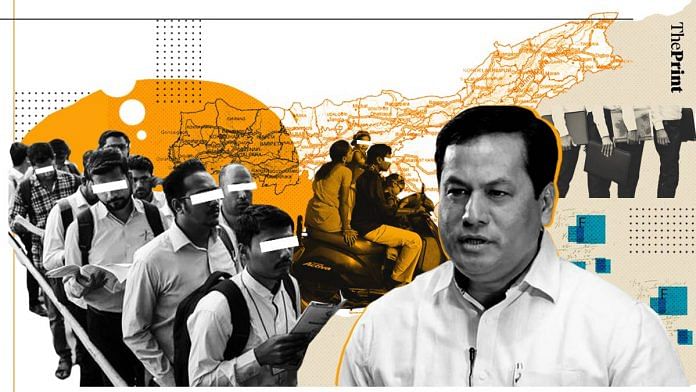The Assam government announced this week that people who have more than two children will not be eligible for government jobs, with effect from 1 January 2021. This follows PM Narendra Modi’s Independence Day call to Indians to have small families. Other states like Rajasthan, Maharashtra and Madhya Pradesh already have similar two-child policies.
ThePrint asks: No govt jobs for those with more than 2 children: Can Assam’s plan check population growth?
There’s no evidence that coercive disincentives work. Population control must be seen with wider socio-economic view
 Poonam Muttreja
Poonam Muttreja
Executive Director, Population Foundation of India
Discussions around India’s population growth have intensified in the last few months. So, the Assam government’s announcement that it will deny government jobs to people with more than two children is only the last straw.
There is no evidence to show that a coercive disincentive works. Moreover, the Assam government’s decision not only disempowers women and marginalised communities, but also goes against India’s commitment to a rights-based approach to family planning.
India’s population data provides hard evidence that the country is well on the path to population stabilisation. According to the National Family Health Survey (NFHS-4), the total fertility rate (TFR) stood at 2.2 children per woman in 2015-16, which is close to the replacement level of fertility of 2.1.
Population stabilisation has to be seen in the context of the wider socio-economic situation in India. States that provided better healthcare services have achieved population stabilisation and development outcomes. The study “Cost of Inaction in Family Planning in India: An Analysis of Health and Economic Implications”, commissioned by the Population Foundation of India, showed that if family planning policies are adequately implemented, then 2.9 million “additional” infant deaths and 1.2 million maternal deaths can be prevented.
We can only hope that PM Modi’s call to have small families will subsequently lead to governments investing and spending more, so that every couple is able to exercise the right to plan family as per its desire and needs.
People of Assam aren’t keen on entrepreneurship, that’s why a government job is an incentive
 Rupam Goswami
Rupam Goswami
Spokesperson, BJP Assam Pradesh
Besides the Assam government’s latest move on applying a condition for the provision of government jobs, there’s another directive that prohibits a person with more than two kids from contesting the panchayat elections.
This decision will definitely work as an incentive when it comes to the issue of population control in India.
Since the people of Assam are not too keen on entrepreneurship, the only other viable alternative left for them is a government job. This is partly why this approach will work in the state.
The regions where Assam’s minorities live are extremely populated, and these are the people who need government jobs the most. Moreover, the state of Assam has actually been able to create many government jobs, which is why this new policy will act as an incentive, and not a disincentive as some claim.
Both the central government and the state administrations need to urgently take measures to control India’s growing population. And the time is ripe for acting on this. The government must take one step at a time, and not take decisions in haste.
Efforts to control population growth do not bear fruit overnight. Controlling population explosion is a slow process and needs to be adeptly tackled.
Linking two-child policy with govt jobs wrongly assumes that everyone wants a govt job
 Sushmita Dev
Sushmita Dev
President, All India Mahila Congress
Linking the two-child policy with getting government jobs is like assuming that everyone wants a government job. If you did a survey of how many people in the country are in government jobs, it wouldn’t be a substantial number.
If one looks at how countries across the world have implemented population control measures, then one will observe that spreading awareness is the key. To think that the Assam government can control population growth by not giving government jobs to people with more than two children is an extremely myopic view. It’s like offering sanitary napkins to school-going girls in regions where there are only a few girls who attend schools. By that logic, one must ask, how many government jobs can the state of Assam provide?
This decision might work to a marginal extent. However, family planning must be incentivised. In a country like India where enacting family planning measures is a huge problem, spreading awareness about its benefits is a must.
We all know about the 2014 Bilaspur case where 11 women died due to ‘botched’ sterilization procedures. Sterilising men is actually much safer, but even this by itself is not a comprehensive solution to the problem of population explosion.
China’s erstwhile one-child policy was extremely controversial, resulting in some children even struggling with trauma.
If the Assam government really wants to restrict population growth, then it needs to educate more women in the remotest pockets of the state.
Also read: Does Modi’s population control call signal India unable to leverage demographic dividend?
Govt must aim for people-oriented, progressive population policies that take care of everyone’s health
 Mala Kapur Shankardass
Mala Kapur Shankardass
Sociologist, Gerontologist and Health Social Scientist
I don’t think such measures are good for the welfare of the people of this country. Incentives such as giving government jobs only to those with two or less than two children is not a progressive step. This should not be the right way to control India’s population growth, which should ideally be done by raising awareness about the benefits of having small families.
The decision to have fewer children can be encouraged by educating adult men and women about how it contributes to their well-being. The choice of having a certain number of children should be left to families. They must be equipped to understand how it can contribute to their health and prosperity.
The provision of a government job, or for that matter any job, should be based on people’s educational qualifications, skills, achievements, and talents, and not linked to the number of children they have. Assam’s approach to curbing population growth through a two-child conditional policy is a retrograde step, which should be rejected by people who have the interest of the country in mind.
The government should aim for people-oriented, progressive population policies that take care of everyone’s health.
Assam govt’s move is opportunistic populism. Focus must be on skilling & employment, not on the negatives
 Amir Ullah Khan
Amir Ullah Khan
Development Economist
Prime Minister Narendra Modi, in his Independence Day speech this year, called the choice of having small families “an act of patriotism”. This new populist slogan can now potentially signal that those who have more than two children are anti-nationals.
This is again opportunistic populism at its best. Reports suggesting that India’s population growth is actually declining is quite opposite to what is usually claimed, but populist politics does not give importance to facts. It will give people only what they want, and will also legitimise unscientific ideas.
Hans Rosling, one of the world’s finest statisticians who worked on public health, had made it clear in 2013 that people who harbour fears about overpopulation have an outdated mindset that there is a polarity between privileged majorities (who are educated, rich, and healthy) and the “Rest”, who are poor, uneducated, unhealthy, and have big families.
PM Modi’s call to have small families indicates a faulty understanding of how demographic transition is unfolding in countries that are doing well on the income, health and education fronts. The surge in India’s youth population should be leveraged to expand the skill development endeavours, and also to boost the manufacturing sector.
Sadly, we have failed to realise the advantages here, and instead of paying attention to skilling and employment generation, we are focusing on the negatives.
This two-child policy should be taken up as a modern solution for population control nationally
 Rajat Sethi
Rajat Sethi
Political advisor to the Manipur Chief Minister
The two-child policy has always been a priority for the BJP at the national as well as various state levels. The government has been looking at many ways to tackle population control and it believes that certain interventions are needed. To create the right incentive structure, this policy will be implemented and is, in fact, not as draconian as Sanjay Gandhi’s coercive population control plan during the Emergency.
It is not infringing on anyone’s human rights, there is no coercion involved and is, in fact, a nudge-based policy and should be welcomed by all communities. The fact that it has been implemented in other states is excellent.
Behavioural cues play a very important role in policy making. Effectiveness of policy measures depend on said cues, and if they are not taken into consideration, such policies will only remain a government programme and won’t have any impact on the ground.
People still look up to government jobs as an important and effective means to secure a future. This incentive will have a clear behavioural change and should be tested out. Perhaps we should also see if it can be taken up as a modern solution for population control nationally.
Also read: Modi govt seeks to adopt China-style facial recognition in policing
By Taran Deol, journalist at ThePrint




The CM is one of the eoght children of his family. Apply the rule to all levels of public representatives also. Why only jobs?
I see no harm, although the children often follow after getting a secure job. Had Sanjay Gandhi not messed up during the emergency, India should have pushed more effectively for population control forty years ago. The demographic dividend has proved to be a mirage. There are still pockets of high population growth in the North where effort is required.